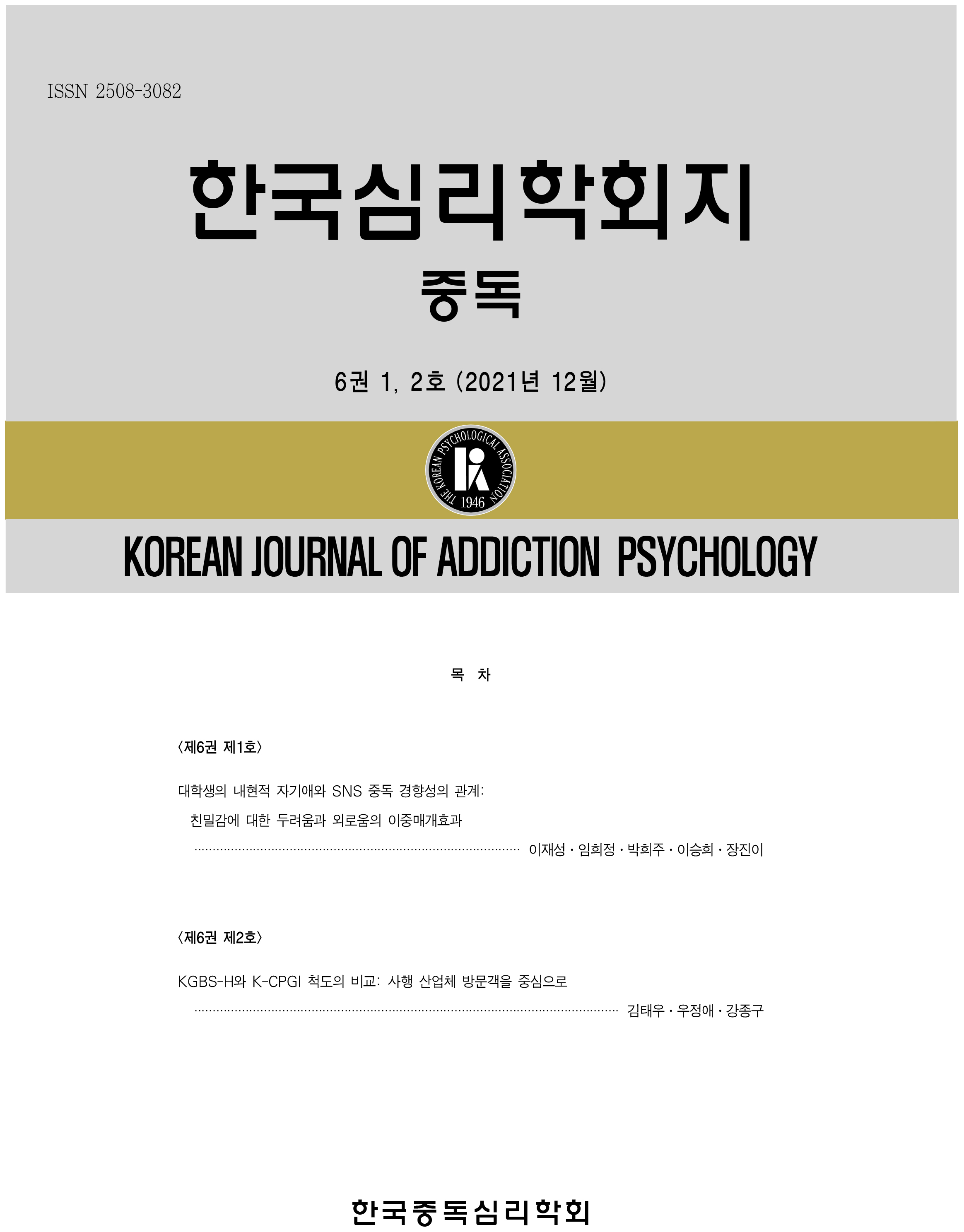- 권한신청
- P-ISSN2508-3082
신경증적 경향성과 알코올중독의 관계: 내면화된 수치심의 매개효과
Relationship between neurotic tendency and alcohol addiction: Mediating effect of internalized shame

초록
본 연구는 신경증적 경향성, 내면화된 수치심과 알코올 중독 간의 관계를 살펴보고, 내면화된 수치심이 신경증적 경향성과 알코올중독 간 관계를 매개하는가를 검증하는 데 그 목적이 있다. 본 연구를 통해 신경증적 경향성이 내면화된 수치심과 알코올 중독에 유의한 영향을 끼치는 것으로 나타났고, 신경증적 경향성과 알코올 중독과의 관계에서 내면화된 수치심이 매개효과를 가진다는 사실을 검증하였다. 주요 결과는, 첫째, 신경증적 경향성은 알코올 중독을 정적으로 예측하고 있었는데, 알코올중독자가 성격특성 중 신경증적 경향성이 높을수록 알코올 중독에 영향을 미친다고 볼 수 있다. 둘째, 내면화된 수치심에 대한 신경증적 경향성의 예측관계를 살펴본 결과, 신경증적 경향성이 높을수록 정서맥락에서 내면화된 수치심을 갖게 되어 부적 정서를 더욱 심각하게 경험한다고 볼 수 있다. 셋째, 신경증적 경향성이 알코올 중독에 유의미한 영향을 미치는 것으로 나타나, 신경증적 경향성이 알코올 중독을 예측하는 데 있어서 내면화된 수치심의 완전매개 역할을 확인할 수 있었다. 즉, 개인의 성격특성 중 신경증적 경향성이 높을수록 내면화된 수치심 경향성이 높게 나타나며 이러한 내면화된 수치심은 병리적인 알코올 사용으로 이어져 알코올 중독에 이르게 된다고 볼 수 있다. 결과적으로 알코올 중독의 예방과 치료를 위해서는 근원적인 성격특성으로 분류되는 신경증적 경향성에 대한 이해와 함께 병리적으로 고착된 정서반응인 내면화된 수치심과 관련한 치료와 회복 프로그램을 개발을 위한 노력이 더욱 필요하다고 할 것이다.
- keywords
- 중독, 성격특성, 신경증적 경향성, 내면화된 수치심
Abstract
The purpose of this study is to examine the relationship between neurotic tendency, internalized shame and alcohol addiction, and to test whether internalized shame mediates the relationship between neurotic tendency and alcohol addiction. This study showed that neurotic tendency had a significant effect on internalized shame and alcohol addiction, and internalized shame was mediated by the relationship between neurotic tendency and alcohol addiction. The main results were as follows: First, the neurotic tendency was statistically predicting alcoholism. The higher the neurotic tendency of personality traits, the more the alcoholic addiction was affected. Second, as a result of examining the predictive relationship of neurotic tendency to internalized shame, the higher the neurotic tendency, the more internalized emotions are experienced and the more negative emotions are experienced. Third, the neurotic tendency showed significant influence on alcohol addiction, and neurotic tendency was found to be a mediating role of internalized shame in predicting alcohol addiction. The higher the neurotic tendency of individual personality characteristics, the higher the internalized tendency to internalize the shame. This internalized shame leads to the use of pathological alcohol, leading to alcoholism. As a result, the prevention and treatment of alcoholism requires an understanding of neurotic tendencies classified as fundamental personality traits and efforts to develop treatment and recovery programs related to internalized shame, which are pathologically fixed emotional responses.
- keywords
- addiction, Personality traits, Neurotic tendency, Internalized shame
- 투고일Submission Date
- 2017-04-05
- 수정일Revised Date
- 2017-05-20
- 게재확정일Accepted Date
- 2017-05-27
- 다운로드 수
- 조회수
- 0KCI 피인용수
- 0WOS 피인용수


